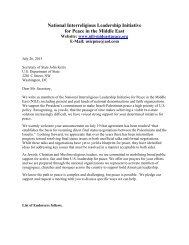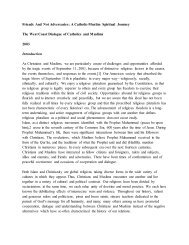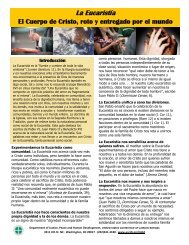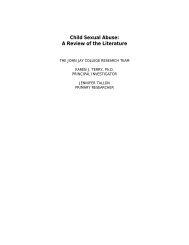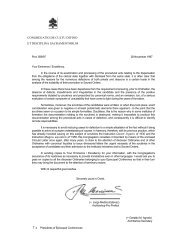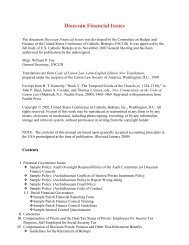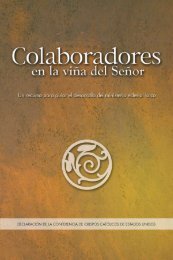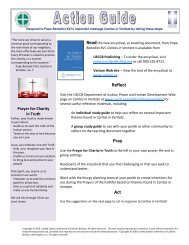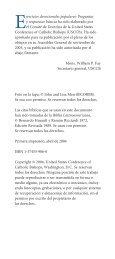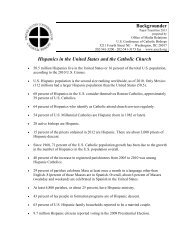Doctrinal Elements of a Curriculum Framework for the Development ...
Doctrinal Elements of a Curriculum Framework for the Development ...
Doctrinal Elements of a Curriculum Framework for the Development ...
- No tags were found...
Create successful ePaper yourself
Turn your PDF publications into a flip-book with our unique Google optimized e-Paper software.
c. Sixth Commandment (CCC, nos. 2331-2400).1) Promote chaste life and love in society,marriage, family.2) Adultery, <strong>for</strong>nication, masturbation,homosexual acts, rape, prostitution,pornography (CCC, nos. 2351-2356).d. Seventh Commandment (CCC, nos.2401-2463).1) Just sharing <strong>of</strong> goods, qualified right toprivate property, just treatment <strong>of</strong>workers, stewardship <strong>for</strong> environment,just economic policies.2) Stealing, unjust damage to o<strong>the</strong>rs’property, destruction <strong>of</strong> environment,enslavement <strong>of</strong> women and children,white-collar crime, violation <strong>of</strong> publictrust, perpetuation <strong>of</strong> third-world poverty.e. Eighth Commandment (CCC, nos. 2464-2513).1) Promote truth in society and media.2) Lies, detraction, perjury, rash judgment,violation <strong>of</strong> pr<strong>of</strong>essional secrets.3) Seal <strong>of</strong> confession.f. Ninth Commandment (CCC, nos. 2514-2533).1) Create conditions <strong>for</strong> chaste life and love.2) Media, advertising, and exploitation<strong>of</strong> lust; “adult” bookstores, Internetpornography.g. Tenth Commandment (CCC, nos. 2534-2557).1) Make simplicity <strong>of</strong> life desirable.2) Cultural attitudes that idealize wealth,materialism.C. Social dimensions <strong>of</strong> <strong>the</strong> Beatitudes (CCC, nos.1720-1729).1. Blessed are <strong>the</strong> poor in spirit.a. Choose a lifestyle that benefits those mostin need.b. O<strong>the</strong>rwise we will tend to materialism,selfishness, exploitation <strong>of</strong> o<strong>the</strong>rs.2. Blessed are <strong>the</strong>y who mourn.a. Be compassionate to those in pain.b. Loss <strong>of</strong> care <strong>for</strong> <strong>the</strong> living and defenseless.3. Blessed are <strong>the</strong> meek.a. Self-discipline in <strong>the</strong> face <strong>of</strong> evil;gentleness, unselfishness.b. Prone to arrogance and disrespect <strong>for</strong>o<strong>the</strong>rs, violence.4. Blessed are <strong>the</strong> merciful.a. Forgive one ano<strong>the</strong>r. Be quick to ask<strong>for</strong>giveness.b. Holding grudges; growth in bitterness.5. Blessed are those who hunger and thirst<strong>for</strong> righteousness.a. Develop a social conscience.b. Indifference to mistreatment <strong>of</strong> o<strong>the</strong>rs.6. Blessed are <strong>the</strong> pure in heart.a. Work on virtues <strong>of</strong> modesty and chastity.b. Lust expressed in many ways.7. Blessed are <strong>the</strong> peacemakers.a. In God’s will is our peace. Per<strong>for</strong>m works<strong>of</strong> peace.b. A divider, troublemaker, warmonger.8. Blessed are those who are persecuted <strong>for</strong>righteousness’ sake.a. Witness to Jesus and <strong>the</strong> Church always;defend <strong>the</strong> innocent, even die <strong>for</strong> your faith.b. Cowardice, betrayal, moral compromise.D. The two Great Commandments: love God with all <strong>of</strong>your heart, soul, and mind, and love your neighbor asyourself (Mt 22:36-40).V. ChallengesA. Why shouldn’t we look out <strong>for</strong> ourselves first? No oneelse will look out <strong>for</strong> me.1. God looks out <strong>for</strong> every human being. He bringsus into being, watches over us in life, and draws usto want to live with him <strong>for</strong>ever. Evidence <strong>of</strong> hisconcern can be found in <strong>the</strong> care <strong>for</strong> one’s wellbeing<strong>of</strong>ten seen in <strong>the</strong> action <strong>of</strong> <strong>the</strong> Church aswell as coming from family, friends, and members<strong>of</strong> communities to which we belong.2. Living in a self-centered way is one <strong>of</strong> <strong>the</strong> effects<strong>of</strong> Original Sin. God created us to live and act ina way that is centered on him and on o<strong>the</strong>rs,not ourselves.3. Selflessness, ra<strong>the</strong>r than selfishness, is <strong>the</strong>characteristic <strong>of</strong> a disciple <strong>of</strong> Jesus Christ, who is<strong>the</strong> living embodiment <strong>of</strong> what it means to live ina selfless way.B. Isn’t <strong>the</strong> degree <strong>of</strong> a person’s success and achievementreally measured in terms <strong>of</strong> financial security andwealth?1. While <strong>the</strong>re are many people who build <strong>the</strong>irlives on such an approach, Jesus Christ, in hislife and his teaching, teaches us that <strong>the</strong> greatestachievement is growth in holiness and virtue andbecoming more like him.42<strong>Doctrinal</strong> <strong>Elements</strong> <strong>of</strong> a <strong>Curriculum</strong> <strong>Framework</strong> <strong>for</strong> <strong>the</strong><strong>Development</strong> <strong>of</strong> Catechetical Materials <strong>for</strong> Young People <strong>of</strong> High School Age



